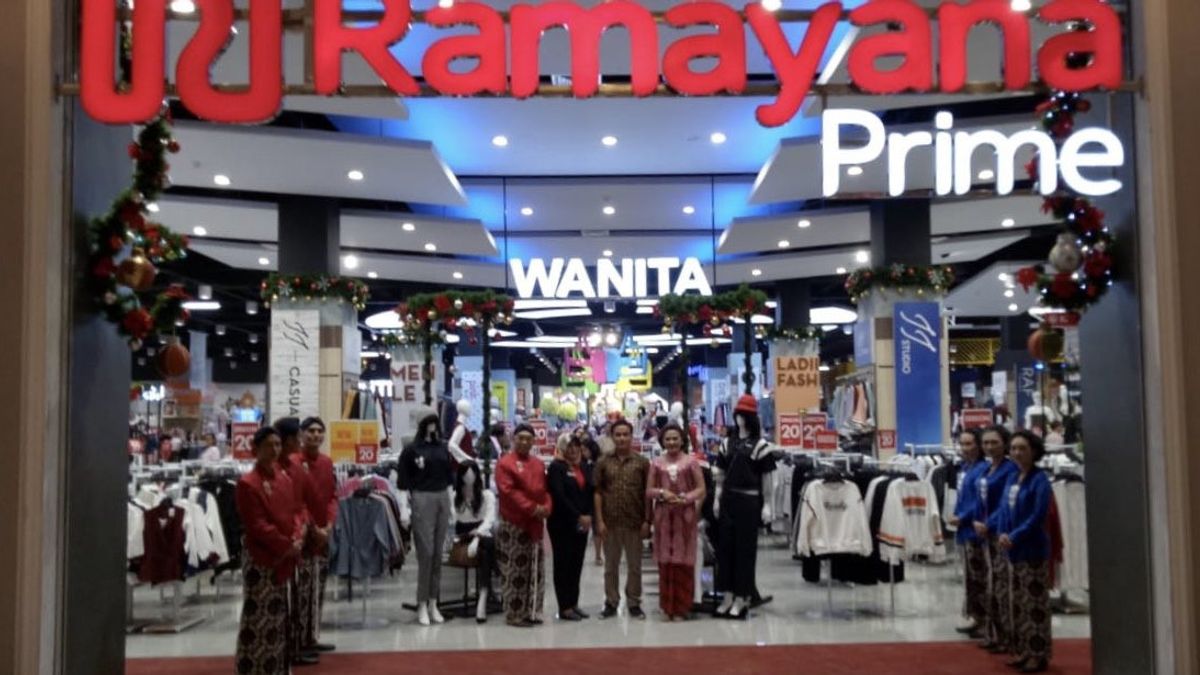JAKARTA - Last week, a video spread about the layoffs that happened to dozens of employees from Ramayana City Plaza Depok. The video immediately went viral, and it was immediately confirmed by the Ramayana Store Manager, M. Nukmal Amdar, that the layoffs were true.
VOI also tried to find out more about the incident by contacting the management of PT Ramayana Lestari Sentosa Tbk (RALS), but did not receive an answer. Finally, yesterday, Tuesday April 14, the company's management through Ramayana's Finance Director, Suryanto, gave the clarification uploaded in the disclosure of information on the Indonesia Stock Exchange (IDX).
Suryanto said the layoffs that were carried out at an outlet in Depok, West Java were in line with the decision to close temporarily Ramayana activities on April 6, 2020. According to him, layoffs were not easy to do because negotiations between companies and employees were tough.
"Finally, it was agreed between the company and the employees through layoffs, layoffs of 84 employees instead of the 300 employees as reported. By giving severance pay," said Suryanto.
According to him, layoffs are not a permanent step taken by the issuer coded as RALS shares. The reason is, he promised that workers who had been laid off could return to join when activities were running back to normal.
He also said that the company has cash and cash equivalents, time deposits and short-term investments that can cover costs in the conditions of the COVID-19 pandemic.
"There was a significant decrease in sales, which made the company have to improve its efficiency, among others, by laying off employees," he said.
The performance of RALS shares is also in an unfavorable trend, aka it continues to decline. On this day alone, Wednesday April 15th, RALS shares ended at the level of IDR570, or fell 5.79 percent compared to Tuesday's closing April 14th.
In the past year, in fact, RALS shares have dropped 67 percent. Quoting Bloomberg, a year ago, on April 15, 2019, RALS shares were still at the level of Rp1,800. At the beginning of 2020, the company's shares were still at the level of IDR 1,070 as of January 1, 2020.

CSA Research Institute senior analyst Reza Priyambada said the retail industry is very dependent on people's purchasing power. In this case, COVID-19 disrupts people's purchasing power due to limited mobility.
As a result, the retail industry suddenly faltered due to this. Other pressing factors for the retail industry are changes in consumer patterns that change transactions from offline to online and competition with fellow retailers.
That is also what happened to Ramayana, where in difficult conditions such as the COVID-19 pandemic, the pressing factors for the retail industry occur simultaneously so that it requires the right strategy. According to Reza, this condition is classified as difficult.
This is because, he said, the company is now facing additional challenges from the market side which have caused share prices to decline. This pressure resulted in the company having to choose a middle way in order to be able to survive indefinitely.
Ramayana has announced the buyback of shares with a value of IDR 250 billion for the period March 17 to June 16, 2020. This step was taken to save its share price, which continued to erode until it reached the level of IDR 500.
"It would be better if the existing funds are used to cover operational costs. Especially like today, where many outlets are closed, they also have to pay for their operations, especially in terms of employee salaries," he said.
Reza said that companies must also move their activities online so that sales are not paralyzed and the remaining workforce can continue to work. For investors, Reza recommends buying with a target price of IDR850 per share.
The recommendation, said Reza, was pinned because the stock price was in the recovery stage and market players had anticipated the expectation of a decline in performance.
Ramayana performance
For your information, Ramayana operates 117 outlets in 54 major cities throughout Indonesia with a total land area of 987,000 square meters as of the end of 2019.
Ramayana's performance in 2019 has yet to be published. However, until the third quarter of 2019, the company earned a net profit of Rp. 612.42 billion, up 16.1 percent compared to the same period in the previous year of Rp. 527.27 billion.
Meanwhile, Ramayana net sales rose 0.7 percent to IDR 6.72 trillion at the end of September 2019. Sales were dominated by men's clothing products by 35.6 percent. Followed by shoes, bags and accessories by 26.6 percent, then fresh, food, drink & toiletries 14.7 percent, women's clothing 10.6 percent, children's clothes 9.2 percent, and others 3.3. percent.
The company has stated that it is targeting an increase in revenue of 19 percent from 2018 which amounted to IDR 8.9 trillion. Meanwhile, the net profit target for 2019 is IDR 650 billion to IDR 700 billion, up more than 10 percent year on year (yoy).
The English, Chinese, Japanese, Arabic, and French versions are automatically generated by the AI. So there may still be inaccuracies in translating, please always see Indonesian as our main language. (system supported by DigitalSiber.id)








